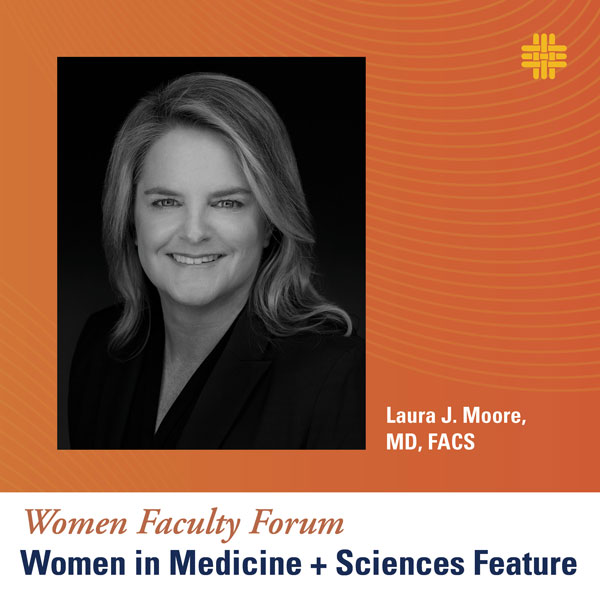Women in Medicine & Sciences Feature: Laura Moore, MD, FACS

Each month, the Women Faculty Forum presents its Women in Medicine and Sciences Feature, highlighting the women faculty at McGovern Medical School who are leaders in medicine, research, and education.
This month’s feature is Laura Moore, MD, FACS, professor in the Department of Surgery.
What is your background? When did you join UTHealth Houston?
I was born in Dallas, Texas. I went to college at Texas A&M University and received a bachelor’s degree in biomedical science. I attended medical school at McGovern Medical School at UTHealth Houston. I completed my general surgery residency training at Rush-Cook County Integrate Surgical Residency in Chicago. I then came back to UTHealth Houston to complete a surgical critical care fellowship. I was recruited back to the Division of Acute Care Surgery in February 2011.
What inspired you to pursue a career in science and medicine?
Since childhood, I have had a love of science and a strong desire to use my abilities to help others. I also really enjoy working with my hands so being a surgeon has allowed me to do the things that make me feel the most fulfilled as a person on a daily basis. As an acute care surgeon, I have the opportunity to perform a wide range of operations, and I have the opportunity to care for critically ill and injured patients. I love the fast pace and unpredictable nature of trauma surgery. I also greatly enjoy the challenges of managing critically ill patients in the intensive care unit.
What are your current clinical and research interests?
I have a strong clinical interest in caring for critically ill and injured patients. I have also recently taken over as the Chief of Surgery at Lyndon B. Johnson Hospital and am committed to expanding the clinical programs that will be offered at the new LBJ Hospital campus, including the next Level 1 Trauma Center for Houston.
My current research focus is on the use of resuscitative endovascular balloon occlusion of the aorta (REBOA) as an adjunct in the management of patients with non-compressible truncal hemorrhage from either traumatic injury or other causes (GI bleeding, post-partum hemorrhage).
Who are your role models?
I have several role models:
Rosemary Kozar, MD, PhD — Dr. Kozar was my mentor during fellowship and continued to mentor me in my research career when I returned as faculty to UTHealth Houston. No matter how busy she was with her own professional activities, she always made time for me. She spent a tremendous amount of time teaching me.
Christine Cocanour, MD — Dr. Cocanour was my first mentor during medical school. She took me under her wing and showed me the ropes of being a surgeon. She taught me so much about surgical decorum and how to be a successful medical student and surgical resident.
Fred Moore, MD — Dr. Moore was my mentor in medical school, and he hired me into my first faculty position when I completed my fellowship. He exemplifies what it means to be a true academic surgeon with excellence in teaching, clinical practice, and research. He led by example and was always mentoring and supporting his junior faculty. He viewed the success of his mentee as being much more important than his own personal accolades. As a leader, I now try to emulate the lessons I learned from Dr. Moore.
What do you enjoy most about working at UTHealth Houston?
The complexity and the diversity of patients that we are able to serve through cutting-edge, evidence-based medicine is a huge reason why I stay at UTHealth Houston. I also really enjoy training the medical students, residents, and fellows that come to UTHealth Houston to further their education.
How do you think UTHealth Houston can further support female faculty?
I am very fortunate to be in the Department of Surgery. This department has a strong track record for supporting female faculty, recognizing their talents, and promoting them accordingly. In my time at UTHealth Houston, I have seen an increasing number of female surgeons be promoted into significant leadership positions. These women serve as very strong role models for others and are a great asset for other female faculty at UTHealth Houston.
Creating avenues for female faculty to connect with and support junior faculty through mentorship would be a great way to further support female faculty at UTHealth Houston.